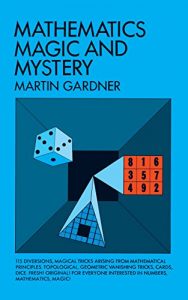Why do card tricks work? How can magicians do astonishing feats of mathematics mentally? Why do stage "mind-reading" tricks work? As a rule, we simply accept these tricks and "magic" without recognizing that they are really demonstrations of strict laws based on probability, sets, number theory, topology, and other branches of mathematics.
This is the first book-length study of this fascinating branch of recreational mathematics. Written by one of the foremost experts on mathematical magic, it employs considerable historical data to summarize all previous work in this field. It is also a creative examination of laws and their exemplification, with scores of new tricks, insights, and demonstrations. Dozens of topological tricks are explained, and dozens of manipulation tricks are aligned with mathematical law.
Nontechnical, detailed, and clear, this volume contains 115 sections discussing tricks with cards, dice, coins, etc.; topological tricks with handkerchiefs, cards, etc.; geometrical vanishing effects; demonstrations with pure numbers; and dozens of other topics. You will learn how a Moebius strip works and how a Curry square can "prove" that the whole is not equal to the sum of its parts.
No skill at sleight of hand is needed to perform the more than 500 tricks described because mathematics guarantees their success. Detailed examination of laws and their application permits you to create your own problems and effects.






